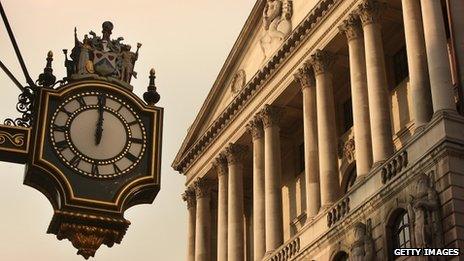Can anyone run the Bank of England successfully?
- Published
- comments

The Bank of England is not an institution in crisis (or, at least, not as far as I can tell).
It has of course been criticised for not providing any decent warning or pre-emptive evasive action, as banks grew to become lethal weapons of mass destruction and markets become dangerously over-heated, in the years before the great crash of 2007-8.
But few would argue that its performance was as lamentable as that of the Financial Services Authority in the comparable period.
If it has committed a crime, it is perhaps one against good manners: it, in the person of its governor, Sir Mervyn King, has never made an unqualified apology for its sins of omission (Sir Mervyn has said that "with the benefit of hindsight" the bank got it wrong - which seemed more a request for forgiveness than an admission of failure).
That said, it is pretty difficult not to see the Bank of England as an admirable and impressive institution.
What I find is that it employs a significantly higher proportion of brainy, independently minded and impressive people than most comparable public sector and public service institutions.
It is slightly horrifying, arguably, that among the 26 people it lists as its top executives and policy makers, external, only one is a woman (who runs a department, human resources, where women are often in charge), and there is not a single member of an ethnic minority.
You don't have to be a diversity obsessive to think that the Bank is not fishing in the deepest and widest talent pool.
Even so, few of the 25 middle-aged white men who run the Bank would be seen as mediocre in an intellectual sense - and it is hard to spot the same proportion of competent bosses or leaders in most private-sector or public-sector organisations.
So the Bank of England ain't bust, though you might be forgiven for thinking that the chancellor thinks it may be - in that his efforts to recruit a Canadian central banker, Mark Carney, to replace Sir Mervyn went way beyond a conventional trawl for candidates.
George Osborne tells the BBC's Robert Peston why Carney was the right choice
When I interviewed Mr Osborne yesterday, he was explicit that Mr Carney was his top choice from the outset. The chancellor has been chasing Mark Carney since February; he kept chasing even after Mr Carney told him privately and in public that he would never do the job; and in the end Mr Osborne agreed to cut the term of office for Mr Carney from eight years to five, and pay him what looks a good deal more than what Sir Mervyn received, even after adjusting for Sir Mervyn's fabulous pension arrangements.
To digress for a moment, there seems to be a nuance of difference between the Treasury and the Bank of England on whether Mr Carney is being more handsomely remunerated than Sir Mervyn: Mr Osborne told me that there is an equivalence between Mr Carney's package and Sir Mervyn's; the Bank of England said comparing their rewards was a case of apples and pears, and that Mr Carney would be doing a bigger job, given that the Bank is getting more responsibilities on his watch (more on this in a mo).
Here is the big point: it is impossible to escape the conclusion that Mr Osborne wants to give a bit of shake to the Bank of England's culture, and that one of the most important things about Mr Carney in the chancellor's eyes is that he is a proper outsider.
Rachel Lomax: Mr Carney has "unique depth of experience"
So what has Mr Carney taken on, apart from the challenge of reinforcing the good and burying the stuffy in the Bank's personality?
Well, he will have to integrate all those bank regulators and supervisors who are being forced to become Bank of England employees, as the Bank takes on responsibility for monitoring the health of individual banks. This in itself will be a significant management challenge (and for all Mr Carney's experience, the Bank of Canada, his current employer, does not do bank supervision).
And Mr Carney will have to create a whole new operation, the Financial Policy Committee, with statutory powers to prevent or gently deflate financial bubbles which - if left to grow unchecked - could wreak havoc (a big hello to the world we inhabit).
Then there is the small matter of making safe Britain's massive banks - the biggest in the developed world relative to GDP, with the exception of Switzerland's - without undermining their ability to support a British economic recovery which is not in any meaningful sense a recovery yet.
Oh and he also has a second precarious balancing act to perform: how to reinforce whatever economic growth can be generated, with money creation and exceptionally low interest rates, without either stoking up incipient inflation (which looks rather a remote risk at the moment, though who knows when and whether that will change) or undermining the credibility of the Bank of England's balance sheet (and therefore ultimately the integrity of sterling and the public finances).
Or to put it more starkly, when you look in the round at what Mr Carney has taken on, it is easy to see why he fled when originally wooed by Mr Osborne - because it is reasonable to ask whether any mortal can do this job.